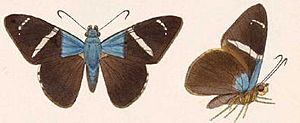Celaenorrhinus aegiochus facts for kids
Quick facts for kids Celaenorrhinus aegiochus |
|
|---|---|
 |
|
| Scientific classification | |
| Synonyms | |
|
The Celaenorrhinus aegiochus is a fascinating type of butterfly. It belongs to a group of butterflies known as Hesperiidae, often called "skippers" because of their fast, darting flight. This particular species was first described in 1876 by a scientist named William Chapman Hewitson.
These beautiful butterflies are found in Central and South America. You can spot them flying in countries like Costa Rica, Panama, and Colombia. They are an important part of the natural world in these regions.
Contents
What is a Skipper Butterfly?
Skipper butterflies are a unique family of butterflies. They have a mix of features that make them look a bit like both butterflies and moths. For example, their bodies are often thicker than other butterflies, and their antennae usually have a hook at the end. This hook is a good way to tell them apart!
How Skippers Fly
The name "skipper" comes from their special way of flying. Instead of a smooth, gliding flight, they move in quick, jerky, and darting motions. It looks like they are skipping through the air! This fast movement helps them escape from predators.
Where Does Celaenorrhinus aegiochus Live?
This butterfly species prefers warm, tropical climates. They are often found in forests and woodlands where there are plenty of plants for them to feed on. Their habitat stretches across parts of Central and South America.
Countries They Call Home
- Costa Rica: A country known for its rich biodiversity and rainforests.
- Panama: Famous for its canal, but also home to many unique species.
- Colombia: A large South American country with diverse ecosystems.
The Life Cycle of a Butterfly
Like all butterflies, the Celaenorrhinus aegiochus goes through a complete metamorphosis. This means they change a lot during their lives.
From Egg to Adult
- Egg: The life cycle begins when an adult female butterfly lays tiny eggs, often on specific "host plants."
- Larva (Caterpillar): The egg hatches into a larva, which we call a caterpillar. The caterpillar's main job is to eat and grow.
- Pupa (Chrysalis): After growing big enough, the caterpillar forms a pupa. For butterflies, this is called a chrysalis. Inside, amazing changes happen.
- Adult Butterfly: Finally, the adult butterfly emerges from the chrysalis. It has wings and can fly, mate, and lay eggs to start the cycle again.
Why Butterflies are Important
Butterflies like the Celaenorrhinus aegiochus play a vital role in their ecosystems.
Pollination
As butterflies fly from flower to flower to drink nectar, they help to move pollen. This process, called pollination, is super important for plants to make seeds and fruits. It helps keep our planet green and healthy!
Food Source
Butterflies and their caterpillars are also a food source for many other animals, such as birds, lizards, and spiders. They are an important part of the food web.
Images for kids
See also
 In Spanish: Celaenorrhinus aegiochus para niños
In Spanish: Celaenorrhinus aegiochus para niños

